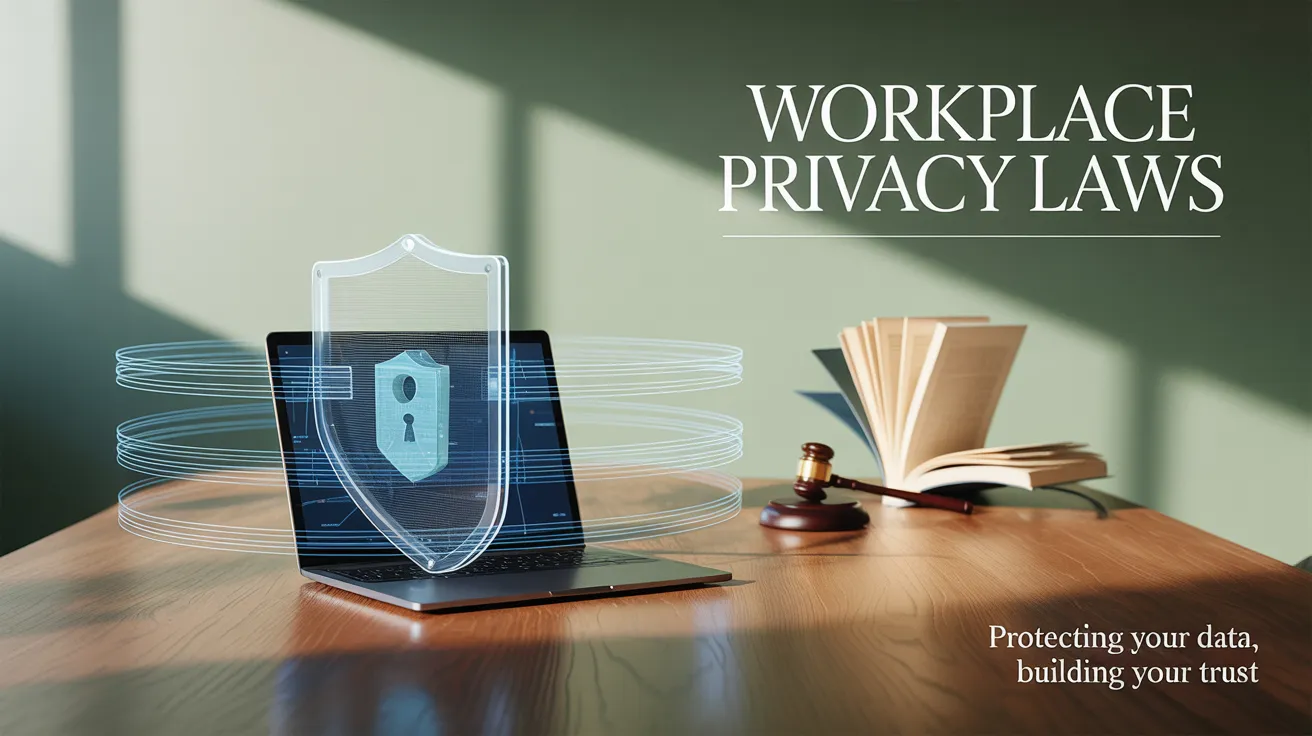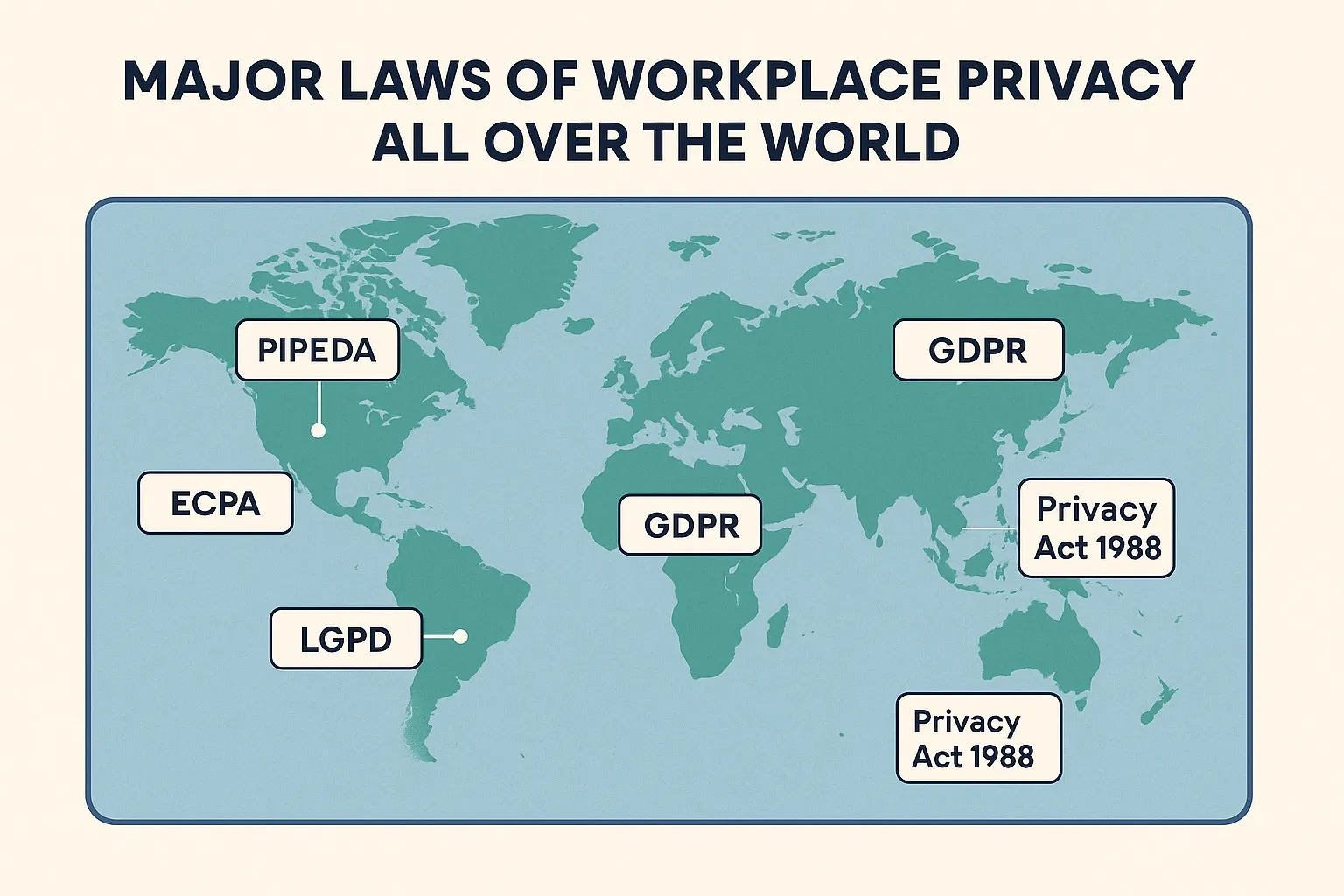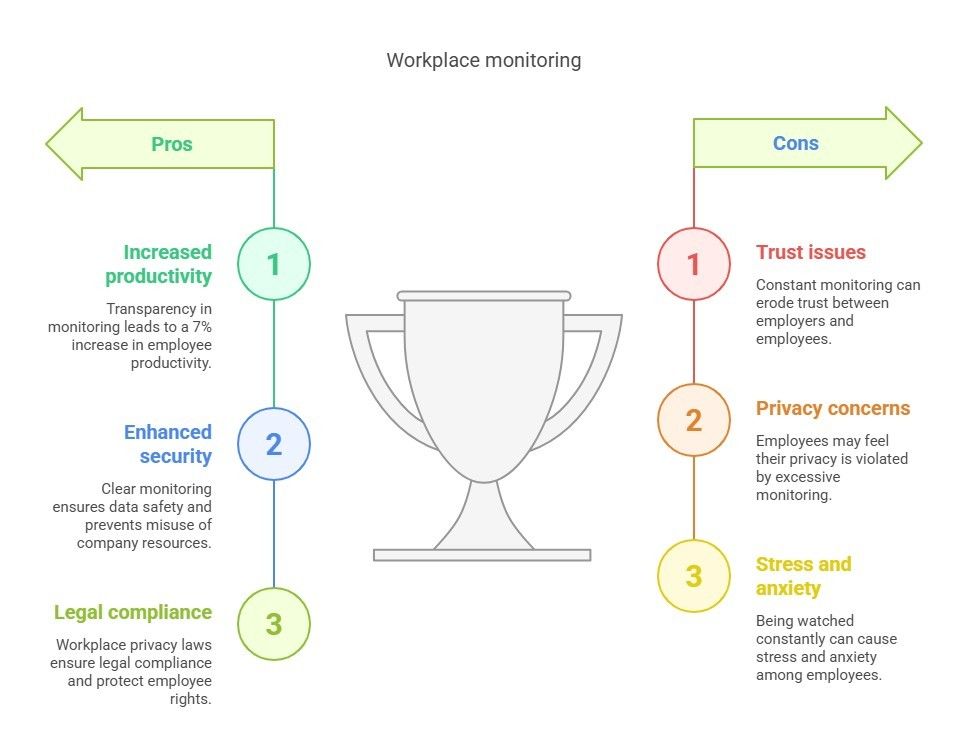Workplace Privacy Laws 2026: Stay Compliant and Build Trust

Summary:
-
Workplace privacy laws define what data employers can collect, monitor, and store. They balance business needs with the privacy of employees.
-
Privacy laws in the workplace change depending on location. It varies from one state to another. The same goes for countries as well.
-
Workplace privacy rules shape modern workplace policies to protect employee rights.
As jobs are getting digital and automated, privacy at work is becoming harder to define. More and more employees are feeling the pressure of being monitored.
That is reflected in 71% of employees who think employee monitoring is unethical.
On the other hand, employers want to protect productivity and company data. For that, 73% of companies use employee monitoring software.
That’s why privacy laws matter. They help set fair rules, offer protection, and encourage transparency.
In this article
- Workplace privacy laws
- How privacy regulations change in the U.S
- Legal overview of employee monitoring and privacy
Start ethical monitoring today
Workplace Privacy Laws Explained
Workplace privacy laws are not found in just one rulebook. Instead, they come from a mix of federal and state laws.
Each one covers a specific type of personal information or workplace situation. And ensure data protection for employees. These are closely related to the employee privacy rights.
1. Health and Medical Privacy
One of the most well-known laws is HIPAA. It’s the Health Insurance Portability and Accountability Act. It protects employee medical records, but in certain situations.
The HIPAA Privacy Rule specifically outlines how healthcare information must be handled in the workplace. Like, employers must keep health information private.
This includes diagnosis, treatment, and any medical claims shared through the plan.
During the COVID-19 pandemic, vaccination status was under this rule.
Another key law is the Americans with Disabilities Act (ADA). It states that any health info shared with the organization must be kept separate from the work file.
Only specific people, like HR or safety staff, can access it.
This regulation also extends to drug testing procedures. And how the results are stored or accessed.
Secure employee private data
2. Genetic and Biometric Data
The Genetic Information Nondiscrimination Act (GINA) is in effect when wellness test or DNA health screenings is involved.
It stops employers from using workers' genetic info.
For example, DNA test results or family health history, when hiring a job applicant.
Also, many states are now creating rules for fingerprints or facial recognition. Such as, Illinois' Biometric Information Privacy Act (BIPA) is one of the strictest. It requires written consent before collecting any biometric data.
This helps prevent identity theft and protects workers' digital footprints.
Now, the consequences of breaking these policies are intense. Take Facebook’s incidents as an example. They had to pay $650 million under BIPA just because they collected facial recognition data without consent.
Get a free consent-based monitoring solution
3. State Data Breach Laws
Every U.S. state has laws that require companies to protect personal information. If there’s a data breach, they must notify affected individuals.
That includes employee data like Social Security numbers or banking info. [Source: National Conference of State Legislatures]
Some states, like California and Colorado, are one step ahead. Their privacy regulations demand that employers be transparent about what data they collect, why they do it, and how they use it.
In 2017, Equifax failed to protect personal data, exposing over 147 million Americans. Many states afterwards tightened their breach notification laws.
And established Systems of Records requirements for better data management.
So, companies must conduct privacy impact assessments to evaluate risks before implementing new data collection practices.
4. Off-Duty Conduct Protections
In California, Colorado, New York, and North Dakota, companies can’t punish off-duty staff regarding their online activities. This includes social media monitoring data or lifestyle choices.
These protections help prevent lifestyle discrimination.
5. Federal Employee Privacy Laws
Regulations in federal agencies are different. The Privacy Act of 1974 protects employee records held by the government.
This law follows the Code of Fair Information Practice principles.
So, agencies can’t share their personal data without written consent. The E-Government Act of 2002 also requires agencies to assess privacy risks when collecting data online.
6. New and Evolving Privacy Laws
Workplace privacy rules are changing fast. In 2023, California considered the Workplace Technology Accountability Act. This is to limit employers' use of surveillance tools and tracking software.
It includes keystroke logging, screen monitoring, and video surveillance systems.
As time passes, more states are introducing employee data privacy bills to close gaps in current laws. Smart employers are already reviewing their policies to stay ahead.
Stay ahead of privacy changes
U.S. Employee Privacy Laws by State
Here’s the truth: where you work matters when it comes to privacy laws.
In the U.S., there’s no single nationwide law that protects all employees in the same way.
Instead, each state creates its own rules about what employers can track, collect, or monitor.
Some states go all in on privacy. Others barely touch it.
Let’s break it down by the states leading the charge and what you need to know.
California: The Gold Standard
California has some of the strongest privacy protections for workers in the country. The California Consumer Privacy Act (CCPA) and California Privacy Rights Act (CPRA) are also applicable to employees.
The California Constitution also provides additional privacy protections that employers must consider.
These laws require employers to tell employees what data they collect, why, and how they will use it.
Besides, workers can request access, correct inaccurate data, or even ask for the deletion of their information.
New York: Mandatory Monitoring Notices
New York takes a strong stance on electronic monitoring. Under the New York Employee Monitoring Law (2022), employers must tell employees in a written document when they monitor internet usage, phone calls, or emails.
This includes disclosure of surveillance cameras and other monitoring technologies.
Illinois: Leading in Biometric Privacy
Illinois is ahead of the curve when it comes to protecting fingerprints, face scans, and voiceprints.
The Biometric Information Privacy Act (BIPA) requires employers to get written consent before collecting or storing biometric data.
Colorado: Consumer and Employee Rights
The Colorado Privacy Act (CPA) applies to employees, as well. According to the law, workers must be notified if their data is collected or sold.
Again, companies must give a choice to decline when they decide to show personalized ads. Or sell your personal information.
Texas: Low Regulation, High Flexibility
Texas has no dedicated workplace privacy law. But that doesn’t mean there are no rules at all.
You see, businesses still need to follow federal laws like HIPAA, ADA, and ECPA.
They must also comply with Equal Employment Opportunity Commission guidelines. Especially while doing a background check, reviewing criminal history.
Washington: Biometric Consent Required
Like Illinois, Washington has rules about biometric data. The law focuses on protecting personal identifiers that could be misused.
So, management must disclose and get consent before collecting things like facial recognition or retina scans.
North Dakota, Colorado, California, New York: Off-Duty Protections
These states protect what you do on your “Me time”.
See, employers can’t punish staff for lawful activities outside of work hours, like what you post on social media or do on weekends.
However, activities that directly harm the company or break laws may still lead to disciplinary actions.
Here’s a quick overview of the workplace privacy law of the U.S state:
Major Laws of Workplace Privacy All Over the World

European Union (EU)
General Data Protection Regulation (GDPR)
The GDPR lays down clear and strict rules on how personal data should be collected, used, and stored. Employers need a legitimate reason to collect data and must be honest with employees.
Workers also have the right to see their data and request that it be deleted.
This law is one of the strongest modern privacy laws. GDPR enforcement has resulted in over €4 billion in fines across the EU.
Australia
Privacy Act 1988
Australia’s Privacy Act 1988 ensures that personal information is handled responsibly. It applies to most government agencies and private organizations.
Employees should be able to know what data is being collected about them and trust that it’s being kept safe. Privacy complaints rose by 3% in 2021–22, reaching 2,544 cases compared to the previous year.
Brazil
Lei Geral de Proteção de Dados (LGPD)
Brazil’s LGPD is quite similar to the EU’s GDPR. It emphasizes transparency and requires organizations to get explicit consent before processing personal data.
Employees have the right to correct inaccuracies and to take more control over their personal information in the workplace.
Canada
Personal Information Protection and Electronic Documents Act (PIPEDA)
PIPEDA is Canada's main law that tells businesses how to handle people's personal information. It covers everything from collecting and using your data to sharing it safely.
Employers must be clear about why they're asking for employees' info. They need permission before using it.
According to a 2023–24 survey by the Office of the Privacy Commissioner of Canada, about half of Canadian businesses now have privacy policies to help them follow PIPEDA's rules and protect employee information.
Why Workplace Privacy Laws Matter
Work has changed a lot over the past few years. Almost 78% of employers are using some kind of employee monitoring. But with that shift, employees face a critical question:
How much privacy is maintained at work?
Now, it’s common for employers to use workplace surveillance to oversee employees’ activities. While this might benefit companies, it also makes many workers feel uneasy.
Over 80% of workers say they feel overly watched. And it’s not only them. 87% of IT managers say it’s hurting morale.
Then there’s AI. As more companies start using it, workers are more concerned about privacy protections.
About 81% of employees are worried that it’ll lead to more invasive surveillance. [Source: Wired]
And the tricky part is that employers and employees don’t always see eye to eye:
- Employers want to make sure work is getting done, data is safe, and no one’s misusing company properties.
- But employees want to feel trusted. They don’t want to feel like they’re being watched constantly.
But here’s the upside.
Transparency makes a positive difference. When companies are clear about employees' expectations of privacy, they feel better about it.

Employee Monitoring and Workplace Privacy Law
Employee monitoring is legal only if it’s done right. U.S. privacy laws permit employers to track productivity as long as they protect workers.
The key is staying transparent, getting consent when needed, and focusing on business-related activity.
Electronic Communications Privacy Act (ECPA) allows employers to monitor emails, internet use, and computer activity on work devices. Only if employees are informed.
Now, the Federal Trade Commission provides guidance on how employers should handle employee data responsibly.
Just so you know, California’s CPRA also demands that employers disclose what employee data they collect and why. States like Illinois and New York go the extra mile by requiring written consent.
Again, employers must be aware of Supreme Court decisions. Because the orders have shaped privacy expectations in the workplace.
On that note, some companies still use controversial practices like polygraph tests and drug testing. These are heavily regulated.
So, the Privacy Program implementation helps ensure these practices comply with federal and state laws.
What’s the takeaway, then?
Monitoring is permitted, but it has to be clear, fair, and purposeful. Studies show employees actually have 7% better productivity when they know what’s being tracked and why.
Get a free legal monitoring solution
Improving Employee Efficiency in the Workplace
Workplace Privacy Law Compliant Best Practices
Following the law isn’t enough. Employers also need to build a workplace where people feel safe and respected.
- Start with a clear employee monitoring privacy policy. Let employees know everything you are looking into and why. Don’t forget to mention how the data will be used. This builds trust and avoids confusion.
- Always get informed consent before monitoring. It’s a simple way to show respect.
• Don’t stretch things too far. Monitoring outside work hours or through webcams can backfire. Research from the European Commission found that over-monitoring leads to stress and lower morale.
- Keep employee data secure. Treat it like your own. Good data practices build confidence and protect your business.
- Lastly, set up audit systems. Track who accesses data and make sure your monitoring stays within legal limits like GDPR and CCPA.
Implement best monitoring practices today
Conclusion
Technology is changing how we work. Now, privacy is more important than ever. Monitoring of employees can help increase productivity, but it can also feel invasive.
That’s why employers and employees must stay informed and involved with the privacy laws and how to use them.
For employers, it’s a must to build trust and keep the company in line with the law. Knowing their rights and using good digital habits helps employees stay safe and in control of their information.
With these laws, it’s possible to create a workplace where people feel trusted, protected, and able to do their best work.
Frequently Asked Questions about Workplace Privacy Laws
What are the privacy rules in the workplace?
Workplace privacy rules vary, but generally, employers must balance operational needs with respecting employee privacy. They can monitor work-related activities but must follow laws like GDPR and ECPA regarding personal data, surveillance, and consent.
What is considered a violation of privacy in the workplace?
A violation occurs when an employer accesses or discloses personal information without consent, monitors non-work-related activities, or shares private details improperly.
Do employees have a right to privacy?
Yes, but it's limited. Employees have some rights to privacy regarding personal belongings, private conversations, and sensitive information, though less so when using company resources.
What are the confidentiality violations in the workplace?
These include sharing private employee information, discussing disciplinary matters publicly, or disclosing sensitive business data without authorization.
Can an employer legally share an employee's personal information without their consent?
Generally no. Sharing personal data like health or financial info without consent may violate privacy laws such as HIPAA or state-specific regulations.
What is the law concerning people at work who are recording your audio and video and taking pics and posting them online without your consent?
Recording or sharing images/audio without consent may violate wiretap, consent, or privacy laws, depending on the state (e.g., all-party consent states.
What are the laws regarding employers checking employees' phones?
Employers generally cannot search personal phones without consent unless the device is company-owned or usage is tied to work-related investigations.
Is it legal for HR to share personal information about employees with other employees?
No, HR should keep personal information confidential. Sharing it without consent could be a breach of privacy and company policy.
Do employers have the right to monitor their employees through cameras in the workplace?
Yes, if the surveillance is for legitimate reasons and not in private areas like restrooms. Notice is often required.
What are the legal implications of an employer monitoring personal cell phone usage without the employee's consent?
Monitoring a personal device without consent may be illegal under federal or state wiretap and privacy laws.
Where is the line drawn for workplace privacy?
The line is typically drawn at personal spaces, communications, and devices not related to work. Employers must justify monitoring with legitimate business reasons.
Can your employer legally take your phone or camera if they see something questionable on it?
Not without consent, a warrant, or clear company policy regarding devices. Taking a personal device can violate personal property rights.
How do you deal with privacy issues in the workplace?
Raise concerns with HR or management, review company policies, and, if necessary, consult legal counsel or regulatory agencies.
Does a company violate privacy if it asks all employees to expose their meeting schedules?
Not necessarily, unless schedules contain sensitive or personal information. Transparency expectations vary by company culture and role.
Is it a breach of privacy for your manager to disclose to other co-workers why you had time off?
Yes, especially if the reason involves medical or personal matters. Managers should keep such information confidential.
Are there any laws about monitoring WFH employees in the US?
Yes, employers can monitor WFH employees for productivity, but must inform them and avoid overreach into personal space or non-work time.
What are the laws in the US regarding employers viewing my work email?
Employers can monitor work emails on company systems, especially if there’s a policy in place. However, they cannot access personal email accounts.
Does an employer have the right to observe/monitor my PC activity when I am working remotely?
Yes, if it's a work device or software is installed with notice. Monitoring must relate to work and follow privacy and labor laws.

